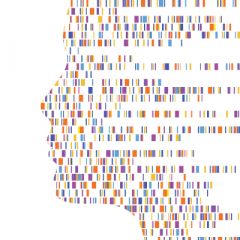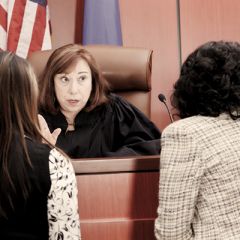Direct-to-consumer (DTC) genetic tests are giving consumers unprecedented, inexpensive access to their genetic predispositions. As a result, state and federal governments have had to grapple with consumer-protection laws and private companies with airtight contracts and clear, conspicuous disclosures. Governments have an interest in robust privacy protections for consumers, yet companies that offer DTC genetic-testing services want to protect their brand and the integrity of their products. The general public stands to benefit significantly from the scientific advancements based on the study of genetic material. But in light of this rapidly growing landscape, what do our client patients, providers, and companies need to know? In her June Illinois Bar Journal article, “Inconclusive Results,” Haley J. Guion provides a history of DTC genetic testing, identifies key stakeholders in the genetic testing market, and outlines corresponding legal principles at issue for these players.
Illinois Bar Journal
-
June 22, 2020 | Practice News

-
June 15, 2020 | Practice News

In her June Illinois Bar Journal Article, “Illinois’ Progressive Prevailing Wage Act,” Kara M. Principe shows why the Act is arguably one of the most progressive prevailing-wage laws in the nation, especially at a time when many states have been acting to repeal similar laws. According to Principe, the most substantial amendments relate to how rates are ascertained and how they are challenged. The amendments also create minority- and local-employment-reporting requirements as well as require new information to be listed on certified payroll records. Principe also explains why penalties for violating the Act are consequential.
-
June 8, 2020 | Practice News

Despite how simple celebrities like Henry Winkler and Tom Selleck make reverse mortgages out to be on their television commercials targeting seniors, loss mitigation for reverse mortgages confounds homeowners, advocates, and judges alike. In his June 2020 Illinois Bar Journal article, “Reverse Mortgages Gone Bad,” Matthew Hulstein explains what families can do to bring a reverse mortgage out of default and keep their home.
-
June 1, 2020 | Practice News

In the Illinois Bar Journal’s June cover story, “Search and Assist,” Thomas Hamilton, vice president of strategy and operations for the legal-research firm ROSS Intelligence, tells the IBJ that “[t]o the extent that lawyers—especially sole practitioners and partners at small firms—also are business people, there’s an enormous suite of AI tools they can leverage to run a more profitable and streamlined business. At the same time, in their capacity as legal professionals, there are now AI tools available that allow them to provide higher-quality work more efficiently and effectively.” Thomas and other technology experts discuss the fast-evolving ways artificial intelligence is making a home in the legal industry, to your benefit.
-
May 26, 2020 | Practice News

An underdiscussed but vitally important aspect of today’s criminal justice system is the ever-expanding role of assessments charged to convicted defendants in criminal cases. These fines and fees charged by states and municipalities aim to minimize the cost of criminal prosecutions on the taxpayers and deter future criminal activity. Nationally, convicted persons are charged an average of $13,607 for conviction-related costs, including restitution and attorney fees. As Benjamin Sardinas notes in his May Illinois Bar Journal artilcle, “The Ball Is in Your Court,” nearly half of convicted persons’ families who helped cover those costs say they could not afford such fees and 38 percent of those families found court fees and fines the most difficult among the costs of conviction. Since the passage of Illinois Supreme Court Rule 472, correcting errors in the calculation and imposition of court assessments have become part of the responsibilities of trial prosecutors and defense attorneys. Sardinas reviews the history of correcting errors in sentencing, the changing legal landscape in the wake of Rule 472, and suggests how criminal trial attorneys may challenge assessments and sentencing errors to prevent their incidence and prevalence.
-
May 18, 2020 | Practice News

The Illinois Code of Civil Procedure allows a party to submit one or more special interrogatories to the jury. A special interrogatory is a question submitted to the jury by a party seeking a determination of a specific issue or question of fact and is submitted along with the general verdict forms. The purpose of a special interrogatory is to test the general verdict by ensuring the jury understood its instructions and each element of the cause of action necessary to enter the judgment indicated. In her May Illinois Bar Journal article, “What’s So Special About Special Interrogatories,” Amy Frantz discusses the use of special interrogatories in general, provides practical tips for attorneys on their use, and highlights recent extensive changes to the special interrogatory statute.
-
May 11, 2020 | Practice News

The legal profession is, out of necessity, practicality, or sometimes sheer stubbornness, notoriously backward looking. It shouldn’t come as a surprise, therefore, to realize that lawyers, judges, and the American legal system were largely unprepared for the coronavirus pandemic. We’re not unique in that, as most Americans seem taken aback by the virus. In many jurisdictions, court dockets have slowed or halted. But that hasn’t stopped the remainder of an attorney’s work from moving forward. Deadlines must be met, motions must be drafted, discovery must be served, and rulings must be issued. In his May Illinois Bar Journal article, “Law in the Time of COVID-19: Looking Backward While Moving Forward,” Brad Taylor asks how does a practitioner fulfill his or her myriad professional responsibilities while self-quarantining, practicing social distancing, and occasionally grappling with masses of frenzied, toilet-paper-obsessed shoppers? Not easily, Taylor says, and not without changing the way we perceive, at least in the short term, how legal professionals perform their roles.
-
May 4, 2020 | Practice News

A decade after limited scope representation (LSR) first became an option in Illinois, Illinois attorneys have used it sparingly. An ISBA member survey undertaken in 2018 showed that less than half (42 percent) of attorneys have engaged in intentional LSR even once, and the vast majority (85 percent) received 10 percent or less of their income from limited scope work. In May’s Illinois Bar Journal feature article, we explore the reluctance to offer LSR and talk with practitioners who are benefiting from providing LSR services to clients. They say LSR is ideal for budget-conscious clients who might otherwise have gone pro se to hold down costs, opens new income streams for attorneys, and eases the burden on court systems flooded with self-represented litigants. The article also points to two LSR webcasts the ISBA is holding: one on May 29; the other on June 10.
-
April 27, 2020 | Practice News

Attorneys and their firms operate on both sides of the online consumer and data-collecting divide. We interact with all manner of websites and services, and therefore care that private information is safely managed. We also operate websites and services where consumers and our clients expect the same. Government regulation of personal information at state, national, and supranational levels is just beginning and cannot be ignored. Since websites know no geographic boundaries, attorneys—particularly those with firms that operate in multiple states or internationally—must educate themselves about these issues. In April’s Illinois Bar Journal’s Practice HQ column, “Don’t Be a Cookie Monster,” Affinity Consulting Group’s Jeffrey Schoenberger summarizes how website cookies work and an attorney’s obligation to be aware of the internet’s data-collecting nature.
-
April 20, 2020 | Practice News

Consider the following sequence of events: The trial court enters summary judgment in favor of the defendant and strikes the affidavit of plaintiff’s expert witness. Within 30 days, the plaintiff files a motion for reconsideration of the foregoing order. The motion is stricken because the plaintiff failed to provide the judge with a courtesy copy of the motion. The plaintiff then renotices the motion (and, presumably, provides a courtesy copy this time). The motion is heard and denied on the merits six weeks later. Within 30 days of the denial, the plaintiff files notice of appeal. If, based on the foregoing, you thought the plaintiff perfected a timely appeal, think again, writes Reuben A. Bernick in his April Illinois Bar Journal article, “Perils of the Postjudgment Motion,” which offers a practical examination of postjudgment motion practice.

